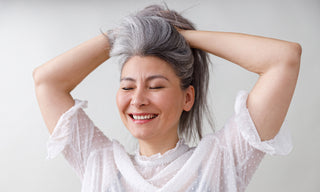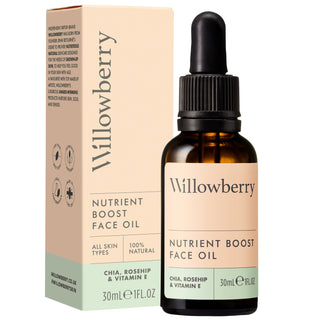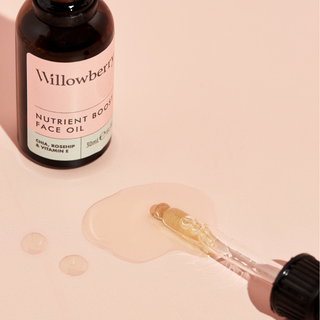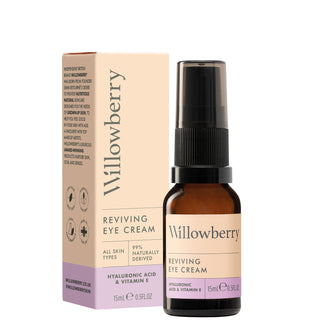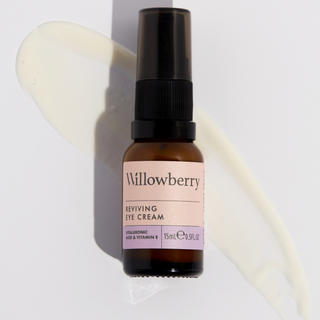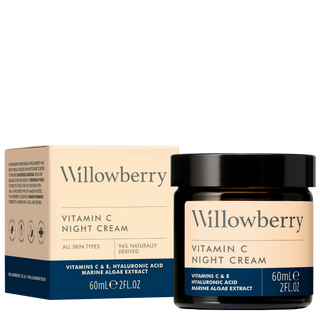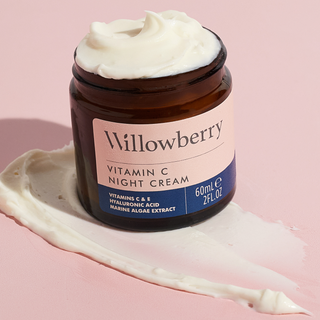Going grey (or silver or white) is a very personal journey. It can happen at just about any age; it may happen suddenly or be a very gradual process; the grey may helpfully appear evenly throughout your hair or surprise you with random patches or streaks. You may love it or hate it. There’s certainly no reason to dread it, though. It is as beautiful as any shade and can look stunning – or subversive. The trickiest part can be knowing how to manage it as it grows in.
It’s a subject that comes up a lot on our Willowberry Age Without Apology series so we asked the experts, Consultant Trichologist Mark Blake and Colourist Josh Wood, for their advice. Here's the lowdown on understanding grey hair and how to go grey with confidence.
Why does hair change colour and texture with age?
Around the time of midlife, women can start to notice changes to the colour and texture of their hair. Fluctuating hormone levels are the primary reason behind hair changes, as oestrogen declines and testosterone levels remain the same. Consultant Trichologist Mark Blake, who runs a number of specialist clinics around the country including in London’s Harley Street, explains that the hormone DHT (dihydrotestosterone) also plays a part: “With a high proportion of female hair follicles sensitive to a certain type of DHT, these lowering oestrogen levels can lead to miniaturisation of each individual hair, causing the hair to look finer and lank. Hair colour is also lost as the follicle stops producing melanin (the colour pigment that you see in your hair). Most women by fifty will have fifty percent grey or white hair.”
Will my hair go coarse as it becomes grey?
Those stray greys can seem to be a whole different texture to the rest of your hair. Not so, says Mark. “It’s actually a myth that your hair gets coarser. The reason hair feels different as we age is because the sebaceous glands based around the hair follicle stop secreting as much sebum, leading to drier hair.”
How can I manage the transition stage of going grey?
One man who knows a thing or two about managing grey hair, having saved the nation during lockdown with his at-home root touch-up kits, is colourist to the stars Josh Wood. When it comes to the transition stage, he advises “easing out the grey, rather than going cold turkey. You can handle this by using a lighter colour over time – so if you have been covering grey with a 6 you can graduate to a 6.5 or 7. As enough grey is exposed, then you can begin to use an icy hair gloss to make it appear lighter and more sparkly”.
What if I don’t want to colour my grey hair as it grows through?
The latest techniques allow you to make the most of your transition to grey/white/silver without having to go all out with the dye. “If you're not colouring your hair and beginning to notice greys that you don’t want to colour completely, then the use of a gloss or semi-permanent colour can help to blend in the grey without covering it 100%”, explains Josh. “Also a professional visit and the application of highlights or lowlights can be very helpful.”
What if I don’t like my natural shade of grey?
Most natural grey is flattering, according to Josh. “If you are unhappy with how it looks it’s more likely to be down to the condition of your hair rather than the shade of the grey. Grey hair can be dull because it is dry and it can look frizzy. In this case, a gloss can make a real difference, as can a mask, conditioning hair to look silkier.”
How should I care for my grey hair?
Grey hair does need a little TLC to keep it looking its best. According to Mark, a regular wash is your best friend: “Grey/white hair needs washing frequently, as any dirt or grime attached to your hair can stain it, causing yellow or brassy tones. Use a volumising shampoo and a moisturising conditioner only on the mid lengths and ends, as you don’t want to weigh your hair down. Using a purple shampoo will make you hair fluoresce giving you a brighter, cleaner look. Just remembering to wash your hair frequently will always give you a lift.”
Willowberry is nutritious natural skincare for grown-ups, for your best skin.
A favourite with top make-up artists, Willowberry's luxurious award-winning products protect skin’s natural barrier function, to nourish and revive grown-up skin without telling women to be 'anti-ageing'.
As seen in Vogue, Independent, The Telegraph, This Morning and more.

